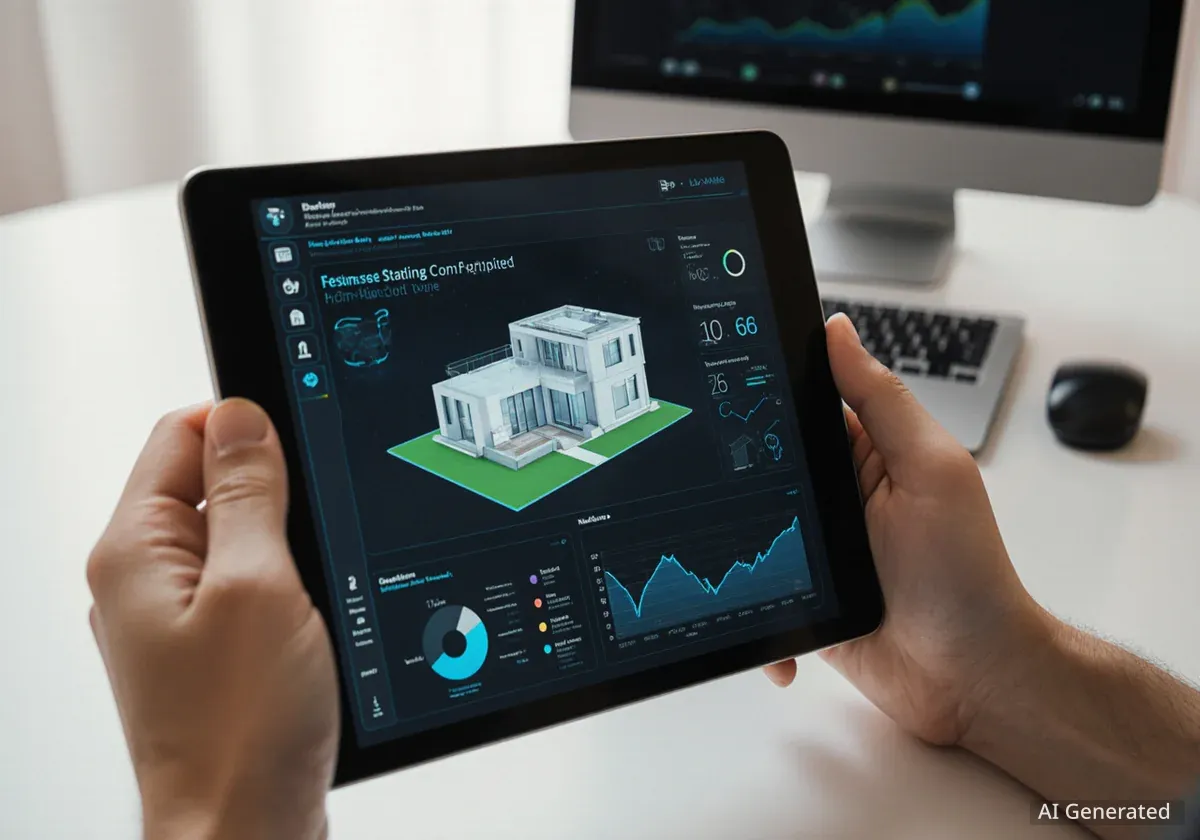Opendoor Technologies is undergoing a significant transformation, moving beyond its origins as a home-flipping service to become an artificial intelligence-driven real estate marketplace. The company reported $1.6 billion in revenue for the second quarter of 2025 and achieved its first quarter of adjusted EBITDA profitability since 2022, suggesting its investments in technology are beginning to yield substantial results.
Key Takeaways
- Opendoor reported $1.6 billion in revenue for Q2 2025 and its first adjusted EBITDA profitability in three years.
- The company's strategy now centers on an AI-powered pricing engine that analyzes millions of data points for home valuations.
- The recent appointment of former Shopify COO Kaz Nejatian reinforces its shift toward becoming a real estate commerce platform.
- Opendoor's stock (OPEN) has surged over 347% in the past three months, significantly outperforming the broader market.
A Strategic Shift to AI-Powered Commerce
Opendoor is strategically repositioning itself in the real estate market, with artificial intelligence at the core of its new operating model. The company is no longer just an iBuyer but is building a comprehensive digital platform for property transactions.
This evolution is powered by a proprietary AI pricing intelligence engine. The system has been trained on a massive dataset, including millions of property photos, notes from real estate agents, and records from home visits. This data allows Opendoor to generate faster and more accurate home valuations for its services.
New Tools Drive Efficiency
The company's technology supports its primary offerings, including its direct "cash offer" model and its "Cash Plus" hybrid service. These products are designed to provide homeowners with more certainty and speed in the selling process.
A key component of this ecosystem is the new Key Agent app. This tool allows affiliated real estate agents to conduct in-home assessments, with the collected data feeding directly back into Opendoor's AI models. According to the company, this continuous data loop improves predictive accuracy and has already doubled conversion rates compared to traditional methods.
By the Numbers
Opendoor's recent performance highlights its strategic shift. The company generated $1.6 billion in revenue in Q2 2025. More significantly, it marked a return to adjusted EBITDA profitability for the first time since 2022, a key indicator of operational health.
New Leadership Signals Commerce Focus
The company's transition into a technology-first enterprise was further solidified by the recent appointment of Kaz Nejatian, the former Chief Operating Officer of Shopify. Nejatian's background at the e-commerce giant signals Opendoor's ambition to streamline the home buying and selling process.
Described as an "AI-native executive," Nejatian has a clear goal for the company's future. He aims to make the process of buying or selling a home as straightforward as any other online purchase.
Nejatian's stated mission is to make a home transaction "as simple, fast, and certain as any digital transaction," reflecting a fundamental change in how the company views the real estate market.
While the broader housing market continues to face pressure from high mortgage rates, Opendoor is betting that its technology-driven platform will create a more efficient and resilient business model. This approach could establish a new standard for digital operations in the real estate industry.
Competitive Landscape in Real Estate Tech
As Opendoor accelerates its AI-first strategy, it faces growing competition from other major players in the property technology space, namely Zillow Group and Compass Inc. However, each company is pursuing a distinct approach to integrating artificial intelligence.
Diverging AI Strategies
The three companies are using AI in different ways:
- Opendoor: Focuses on end-to-end transaction automation and AI-powered valuations to create a commerce-like experience.
- Zillow: Uses AI primarily to enhance its search and advertising platforms, personalizing listings for users.
- Compass: Integrates AI tools to support its real estate agents, aiming to improve workflow and lead generation.
Zillow and Compass Approaches
Zillow continues to refine its AI algorithms for search personalization and advertising monetization. The company previously attempted an iBuying model but retreated, highlighting the operational challenges that Opendoor aims to solve with its automated system.
Compass, on the other hand, operates as a tech-enabled brokerage. Its AI tools are designed to empower its network of agents by streamlining tasks and providing data-driven pricing recommendations, particularly within the luxury market. Its focus remains on agent support rather than full transaction automation.
Opendoor's key differentiator is its deep data ecosystem and its focus on automating the entire transaction. This end-to-end approach may provide a competitive advantage in transforming real estate into a true digital commerce category, setting it apart from Zillow's search-focused model and Compass's agent-centric platform.
Financial Performance and Market Reaction
Investors have responded positively to Opendoor's strategic pivot and improved financial results. Shares of the company (ticker: OPEN) have experienced a dramatic surge, rising 347.3% over the past three months. This performance has significantly outpaced the real estate industry average, the broader tech sector, and the S&P 500 index.
Valuation and Future Estimates
From a valuation perspective, Opendoor currently trades at a forward price-to-sales (P/S) multiple of 1.04. This is considerably lower than the industry's average multiple of 5.45, which could suggest that investors see further room for growth as the company executes its strategy.
Analysts are also noting improvements in the company's financial outlook. The Zacks Consensus Estimate for Opendoor's 2025 loss per share has held steady at 24 cents. This figure represents a significant improvement from the 37 cents per share loss reported in the previous year, indicating progress toward sustained profitability.
The combination of technological innovation, strategic leadership changes, and strong stock performance suggests that Opendoor's transformation into an AI-powered commerce engine for real estate is gaining momentum in the market.





